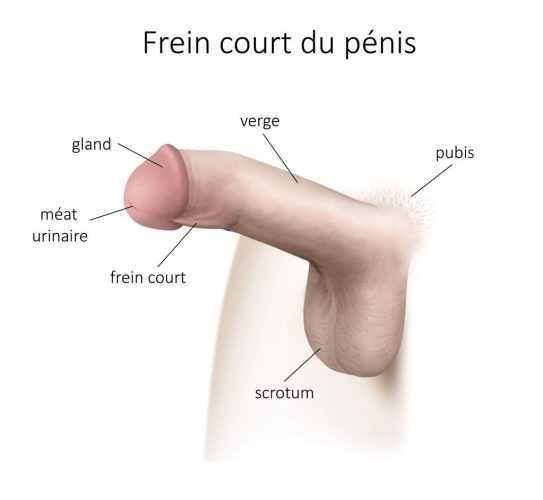The frenulum is a membranous line that connects the glans penis to the skin of the penis. If it is too short, it causes the glans to be pulled downwards, but this does not prevent the foreskin from retracting. A short, narrow and fragile foreskin can be a real handicap for young men during sexual intercourse. When the erection is strong enough, the frenulum can become painful during penetration. In some cases, it can rupture or crack, causing heavy bleeding.
Frenulum tear is a common phenomenon among young men who have just started their sexual activity. What to do in this situation? What treatments are available? The urologists at Les Cliniques Marois can help you understand the problem.
What is the frenulum?
The penis frenulum is a thin membrane under the glans penis that connects the glans penis to the lower part of the foreskin. The foreskin is the extra skin that covers the glans. During erection, it retracts to make room for the glans. The frenulum has a triangular shape and is somewhat souple, depending on the anatomy of each man. It can therefore be located just below the meatus of the urethra. This membrane contains an artery that can cause an abundant flow of blood in case of rupture.
The frenulum is involved in sexual stimulation and thus helps to trigger ejaculation. If this membrane is pinched during intimate relations, it can delay ejaculation at that moment. The frenulum alone, however, cannot provoke sexual stimulation. This is because the receptors for sexual pleasure in men are located precisely in the glans penis and not in this small membrane. This is why sexual pleasure remains the same even in men who have had a frenulum procedure or who have been circumcised.


What is frenulum tear ?
The rupture of the penis frenulum is actually a tear in this membrane. This accident usually occurs during sexual intercourse or in rare cases during masturbation.
The frenulum is a very sensitive area, and rupture can cause sharp, momentary pain. The sufferer will then notice significant bleeding due to the many blood vessels in this area of the penis. This phenomenon, which can be a source of panic, is benign. It can occur in men of all ages, but is somewhat more common in young adults who are in the early stages of their sexual lives. The rupture of the frenulum does not usually lead to any complications.
After a Frenulum tear, the area may be tender for a few days. Eventually, however, it heals. Unfortunately, even after healing, the phenomenon may recur if he resumes sexual activity. The frenulum may not rupture in some men whose membrane is larger and stronger. During erection, however, it can cause a painful pulling sensation. This sensation can lead to certain types of premature ejaculation in a man.
Risk factors for frenulum tear
Certain anatomical factors may favor the rupture of the frenulum in an elderly man as well as in a young adult. Firstly, this phenomenon is very common in people who have a short frenulum. Once erect, the tension can weaken the frenulum. Unhooding during coitus becomes very uncomfortable. Sudden or intense back-and-forth movements during sexual intercourse can also cause the frenulum to fracture. These movements pull on the frenulum and cause it to tear. In some cases, this can cause the frenulum to rupture.
Fracture of the frenulum can also be caused by poorly lubricated sex or masturbation. If the lining of the vagina is dry, it can stick to the skin of the penis and pull on it involuntarily. This can lead to a rupture of the membrane.


-
What to do, in case of frenulum tear?
Stop the bleeding!
In the event of a haemorrhage caused by a fractured frenulum, it is important to apply first aid before consulting a doctor or, specifically, a urologist. You should compress the wound, disinfect it and apply a healing cream.Compression is a fundamental gesture that makes it possible to stop the flow of blood, whether it is abundant or light. This gesture allows the blood flow to be interrupted. Blood contains platelets that ensure coagulation. To promote coagulation, it is essential that these platelets clump together to form a fibrous network. This is only possible if the blood flow slows down.
Disinfecting the area is the next step after the blood has stopped flowing. Since the wound is still open, disinfection will prevent bacteria and germs from entering the wound and growing in the body. Disinfection can be done with mild soap and water. It is also possible to disinfect the torn frenulum with a mild product like Betadine. This local antiseptic contains iodine and is used to disinfect wounds, areas at risk of infection… This solution is available in pharmacies without prescription. If you don’t have one, given the urgency of the situation, the first option remains the best. Avoid at all costs using a disinfecting solution that contains alcohol. Contrary to popular belief, alcohol is not at all suitable for disinfecting a wound. It tends to irritate and dry out the wound, which slows down the healing process. Alcohol is only suitable for disinfecting healthy skin and equipment.
The application of the healing cream is recommended in the days following the disinfection. As its name indicates, this cream is used to accelerate the healing process of a wound. It is also useful to improve the appearance of the scar.
In this case, the healing cream serves to sanitize and moisturize the wound so that it is conducive to healing. It also helps to relieve pain and discomfort and reduces itching due to the healing process.Don't panic if the frenulum breaks
When Frenulum tear occurs during intimate relations, the sight of copious blood may cause men to panic. During the first few minutes, the partner should remind him that this phenomenon is not very dangerous and that it is very common in young men. This will help to avoid panic or anxiety. It is essential that he or she be calm in order to perform the first aid procedures.
-
What treatments are effective for Frenulum tear?
After a ruptured frenulum, it is important to see a urologist to see if the area is healing normally. In some cases, the scarring may be fibrous and will increase the tension when the penis becomes erect. Surgery may be considered at this time. The surgeon will perform an operation to plasticize the penis. If it is a complete rupture of the frenulum, it is also possible that a surgical treatment is necessary.
Frenectomy or frenulum lengthening
The frenectomy or lengthening of the frenulum consists in cutting this small membrane with a scalpel. Not very painful, this operation is done under local anesthesia and aims to lengthen the brake in order to avoid a new rupture. For a more aesthetic result, it may be necessary to excise the edges of the frenulum. This avoids any undesirable growths that may appear slightly on the foreskin and the glans. Frenectomy or frenulum lengthening is a surgical procedure that usually takes less than 15 minutes. The convalescence after this surgery is quite short and generally does not require the use of medication. You can return to your professional or daily activities the next day. If you have a job that requires physical effort, it is recommended that you take a week’s rest before returning to work. During recovery, sports training that involves straining this area (e.g., cycling) is prohibited. Sexual intercourse or manual stimulation is prohibited until the injury has completely healed. The length of time it takes for the injury to heal completely may vary from man to man. The length of abstinence therefore depends on this time, but also on the level of comfort tolerated by the man.Circumcision
Circumcision is also an effective solution to protect oneself permanently from the problem of Frenulum tear. This operation consists of removing all or part of the foreskin and cutting the penis frenulum. When the circumcision is complete, the glans is permanently exposed. Partial circumcision consists of protecting the glans by the preputial mucosa and the remaining foreskin. However, this type of circumcision does not have as many protective qualities as the full form. This solution is more suitable for men who have pain during erection or who suffer from phimosis. The convalescence is a little longer than with the frenectomy.At Les Cliniques Marois, surgeons specialized in urology and sexual health, provide you with expert care of your frenulum break in complete safety. Do not hesitate to consult one of our specialists for all your sexuality-related problems (sexual problems, painful erections, loss of libido, etc.). Our specialists will help you identify the source of your problem in order to apply the best possible treatment.


